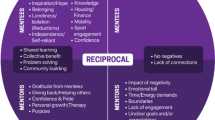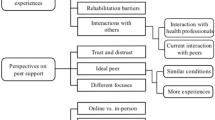Abstract
Study design
Qualitative study.
Objectives
To explore how peer mentors with spinal cord injury (SCI) experience their role in Active Rehabilitation programs in Sweden.
Setting
Community peer-based training programs in Sweden.
Methods
Twenty active peer mentors were strategically selected and invited to participate. Nine individuals of diverse age, level of SCI and time since injury participated in semi-structured interviews via video link. Qualitative content analysis was used to analyze the data.
Results
The theme: Being a vulnerable superhero—a balancing act with rewards was based upon five categories: Being a suitable fit for a demanding culture, Offering a shortcut to coping with spinal cord injury life, Feeling rewarded by helping others, Building trust is reciprocal, and Constituting the norm in a temporary community. The peer mentors expressed vulnerability of sharing life experiences, being a role model and building relationships with mentees. The theme emerged from notions of high expectations and demands of the SCI peer mentor role. Being a peer mentor empowered, educated and inspired the peer mentors themselves.
Conclusions
Peer mentors were continuously balancing between being open and vulnerable, and being strong and capable. Personality traits were reported as more important aspects of the role than physical skills. The individual mentor-mentee meetings and relationships were considered more important than the actual training sessions. Feeling part of a community and the norm through meeting others in a similar situation was perceived as a reward and motivation for participating as a peer mentor.
This is a preview of subscription content, access via your institution
Access options
Subscribe to this journal
Receive 12 print issues and online access
$259.00 per year
only $21.58 per issue
Buy this article
- Purchase on Springer Link
- Instant access to full article PDF
Prices may be subject to local taxes which are calculated during checkout
Similar content being viewed by others
Data availability
The datasets analyzed during the current study are available from the corresponding author on reasonable request.
References
Bodine C, Chen Y, Chhabra H, Donovan W, Greve JDA, Jessup N, et al. Chapter 5: Health systems strengthening. In: Bickenbach J, Officer A, Shakespeare T, Groote Pv, editors. International perspectives on spinal cord injury. Malta: World Health Organization; 2013.
Commission on Accreditation of Rehabilitation Facilities. Medical rehabilitation standards manual. USA: CARF International; 2018.
Divanoglou A, Georgiou M. Perceived effectiveness and mechanisms of community peer-based programmes for spinal cord injuries—a systematic review of qualitative findings. Spinal Cord. 2017;55:225–34.
Gassaway J, Jones ML, Sweatman WM, Hong M, Anziano P, DeVault K. Effects of peer mentoring on self-efficacy and hospital readmission after inpatient rehabilitation of individuals with spinal cord injury: a randomized controlled trial. Arch Phys Med Rehabil. 2017;98:1526–34.e2.
Houlihan BV, Brody M, Everhart-Skeels S, Pernigotti D, Burnett S, Zazula J, et al. Randomized trial of a peer-led, telephone-based empowerment intervention for persons with chronic spinal cord injury improves health self-management. Arch Phys Med Rehabil. 2017;98:1067–76.e1.
Divanoglou A, Tasiemski T, Jörgensen S. INTERnational Project for the Evaluation of “activE Rehabilitation” (inter-PEER)—a protocol for a prospective cohort study of community peer-based training programmes for people with spinal cord injury. BMC Neurol. 2020;20:14.
Aterman S, Ghahari S, Kessler D. Characteristics of peer-based interventions for individuals with neurological conditions: a scoping review. Disabil Rehabil. 2023;45:344–75.
Gainforth HL, Giroux EE, Shaw RB, Casemore S, Clarke TY, McBride CB, et al. Investigating characteristics of quality peer mentors with spinal cord injury. Arch Phys Med Rehabil. 2019;100:1916–23.
Sweet SN, Hennig L, Shi Z, Clarke T, Flaro H, Hawley S, et al. Outcomes of peer mentorship for people living with spinal cord injury: perspectives from members of Canadian community-based SCI organizations. Spinal Cord. 2021;59:1301–8.
Divanoglou A, Tasiemski T, Augutis M, Trok K. Active Rehabilitation-a community peer-based approach for persons with spinal cord injury: international utilisation of key elements. Spinal Cord. 2017;55:545–52.
Graneheim UH, Lundman B. Qualitative content analysis in nursing research: concepts, procedures and measures to achieve trustworthiness. Nurse Educ Today. 2004;24:105–12.
Tong A, Sainsbury P, Craig J. Consolidated criteria for reporting qualitative research (COREQ): a 32-item checklist for interviews and focus groups. Int J Qual Health Care. 2007;19:349–57.
Ohman A. Qualitative methodology for rehabilitation research. J Rehabil Med. 2005;37:273–80.
Lincoln YS. Naturalistic inquiry. Guba EG, editor: Beverly Hills, California: Sage; 1985.
VERBI Software GmbH. MAXQDA standard. Berlin: VERBI Software GmbH; 2020.
Veith E, Sherman J, Pellino T, Yasui N. Qualitative analysis of the peer-mentoring relationship among individuals with spinal cord injury. Rehabil Psychol. 2006;51:289–98.
Shaw RB, McBride CB, Casemore S, Martin Ginis KA. Transformational mentoring: leadership behaviors of spinal cord injury peer mentors. Rehabil Psychol. 2018;63:131–40.
Standal Ø. “I Learned Nothing from Him …”. Reflections on problematic issues with peer modeling in rehabilitation. Phenomenol Pract. 2011;5:48–58.
Acknowledgements
We acknowledge the informants of the current study for their contribution. We also thank RG Active Rehabilitation for facilitating the study, Sophie Jörgensen for contributing to the design of Inter-PEER, and Andrew Strong for valuable proofreading assistance.
Funding
The current study was funded in part by the Promobilia Foundation.
Author information
Authors and Affiliations
Contributions
The manuscript is based on the Master project by JL, supervised by GS and AD. AD conceived inter-PEER and is the principal investigator. All authors contributed to the design of the study. JL collected all data. Data analysis was conducted by JL with input by GS and AD. JL wrote the first draft of the manuscript with input by AD and GS. All authors reviewed and edited subsequent versions of the manuscript. AD and Sophie Jörgensen prepared the ethics application and secured funding. All authors approved the final version of the manuscript.
Corresponding author
Ethics declarations
Competing interests
The authors declare no competing interests.
Ethical approval
This study is part of the larger project Inter-PEER and was approved by the Swedish Ethical Review Authority, DNR 2018/313–31/5; 2019–01032. All informants in the study received written and oral information about the study. Before the interviews, all informants were informed that participation was voluntary and that they did not have to answer questions that made them feel uncomfortable, and that they at any time could choose to stop the interview and drop out of the study with no consequences. Written consent was received from all informants.
Additional information
Publisher’s note Springer Nature remains neutral with regard to jurisdictional claims in published maps and institutional affiliations.
Supplementary information
Rights and permissions
Springer Nature or its licensor (e.g. a society or other partner) holds exclusive rights to this article under a publishing agreement with the author(s) or other rightsholder(s); author self-archiving of the accepted manuscript version of this article is solely governed by the terms of such publishing agreement and applicable law.
About this article
Cite this article
Lindén, J., Stenberg, G. & Divanoglou, A. The vulnerable superhero—a qualitative study investigating how spinal cord injury peer mentors experience their role in Active Rehabilitation training programs. Spinal Cord 61, 541–547 (2023). https://doi.org/10.1038/s41393-023-00923-0
Received:
Revised:
Accepted:
Published:
Issue Date:
DOI: https://doi.org/10.1038/s41393-023-00923-0



